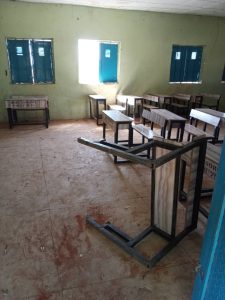By Amanatullahi Yusuf
As the sun sets on a typical Friday morning in Gidan Yaro Community School, Wanmako Local Government, Yusuf, an 11-year-old primary school student, strolls aimlessly through his village. Despite his school being mere steps away from his house, he wandered around during what was supposed to be learning time.

This time, their morning school session should have begun, but the usual hum of classrooms was absent.
Despite the start time, no school teacher was in sight to signal the beginning of the lesson as every classroom remained empty with no single student.
“The teachers don’t come every day,” Yusuf told The News Digest Press. “I only go to school when I know the teacher is there.”
From Farm to University Hostel: Life without Formal Schooling
Amina Bello, one of the children who has never experienced formal education despite the school being close to her, told the reporter during the interview that she does not attend school.
According to her, she only spends her time at her parents’ farm or helping students in Usmanu Danfodiyo University hostel for a meager income.
Her words reflected a broader feelings: a lack of concern for formal learning and a contrast to what one might expect from a learning environment.
“ I have never stepped on my feet in class. I only help my parents on the farm. And from there, I will go to UDUS hostel to work for students to get a little income for myself.”
In northern Nigeria, the situation is particularly dire. According to Daily Trust, 60 percent of these children are in the North, where factors like the Boko Haram insurgency have compounded the crisis.
Research from the Improving Systems of Education (RISE) initiative indicates that around 10.5 million children aged 5-14 are out of school, with half residing in the northern region.
Recent data from UNESCO reveals a startling figure: Nigeria now has 20.2 million out-of-school children, a number that has doubled over recent decades. Nigeria accounts for one in five of the world’s out-of-school children, with a staggering 15 percent of the global total.
UNICEF reports that one in three Nigerian children is out of school, totaling approximately 10.2 million in primary and 8.1 million in secondary school.

Parents React
Abubakar Kasimu (Buba), a parent from Gidan Yaro, explains that during the rainy season, Fulani cattle invade farms, leading to children being withdrawn from school to guard crops. Once the harvest is over, children return to their studies.
In n interview with a woman who prefers to be addressed as Safiya, a young mother, attributes poor attendance to inconsistent teaching. “The teacher often leaves for other schools, and since there is only one teacher, the children don’t come when he is absent.”
Speaking with The News Digest Press, Shehu Mai Anguwa, the village head, acknowledged the issue but admits he is unsure why children skipped school on a particular day. His remarks offer little insight into how to address the problem.
“Lack of writing materials contribute to school issue”– Teacher
Having spent almost an hour in the village conducting the interview, the teacher arrived, but no students were present in the classrooms.
When asked about the absence of the students in the school, Mallam Kabiru, the only teacher at Gidan Yaro’s community school, expressed frustration over the lack of student commitment despite free education.
“Not all students have writing materials,” he notes. He asserts that he is present daily but still sees poor attendance. With the headmaster’s recent transfer, he is the only teacher, forcing him to make a lengthy daily commute from Emir Yahaya.
Kabiru proposes that enhancing the school environment might help. “Creating an enticing playground could attract more students,” he suggests.
For him, he believes that a school feeding program would encourage attendance, as some children miss school in search of food.
He also noted that stronger enforcement of compulsory education by the village head could improve attendance.
He added , “ I go down to the village everyday to chase the children to school with the village head, a situation which isn’t proper and despite that, the attendance is still low.”
“Education is a right of all”–Expert Weighs in
In an interview with Dr Muritala Akanbi Yusuf, a lecturer from the Faculty of Education at Usmanu Danfodiyo University, Sokoto, he emphasized that education should be a right for every.
According to him, he believes that regardless of the circumstance, everyone should have the opportunity to access quality education.
“ I believe the school is in a community where the poverty level is very glaring and children who are very poor may not even consider going to school,” he said.
“ Also, the low turnout is due to lack of proper educational facilities and resources, as the school in the Gidan Yaro community is not a school in the real sense.”
Speaking on the implication of lack of education, Dr Martala stressed, “ The children’s future is very bleak because education prepares children for future roles and there is a possibility that in future they would not be able to perform the role expected of them.”
He further maintained that the community should reach out to the government in addressing some of the socio economic reasons responsible for poverty in the community.
